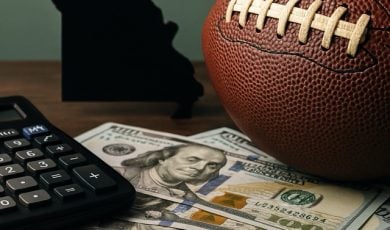Mississippi online sports betting legislation once appeared on its way to passage in 2024.
However, like with online gaming and sports betting bills in other states this year, the effort fell apart. The legislative session concluded Saturday with mobile sports betting legislation HB774 having died in conference committee earlier in the week.
PlayUSA spoke with conference committee members from the House and Senate to find out why Mississippi online sports betting legislation didn’t reach the finish line. Ultimately, a lack of consensus among Mississippi casinos and Senate concerns regarding increased gambling addiction doomed the bill, but other factors played a part along the way.
During the final week of the session, the conference committee had a Senate offer and a House counteroffer but no negotiations.
Rep. Casey Eure, who chairs the House Gaming Committee, told PlayUSA:
“I think the Senate just didn’t have an appetite for mobile sports betting, which is a shame because we’re losing millions to illegal sites. I believe this is something Mississippians really want. In my 14 years in the legislature, I’ve never gotten more calls on any issue than for mobile sports betting. And I never got a single phone call with someone opposing.”
Tie-in to coastal casino bill doesn’t work
The Mississippi House fully embraced online sports betting, passing HB774 by a 97-14 vote in February.
Then the Senate sat on the bill for two months. Part of the problem was that Mississippi has 26 casinos located along the Mississippi River and the Gulf Coast. All of them have physical sportsbooks, which Mississippi legalized in 2018.
Some Mississippi casinos are concerned about the impact mobile sports betting would have on their brick-and-mortar properties.
A plan emerged to appease smaller casinos along the Gulf Coast, led by Island View Casino Resort, by giving them something they wanted in SB2780. Senate Gaming Committee Chair David Blount introduced the bill, which protected current Mississippi casinos from further competition by preventing new leases for gambling-related activities along the Sand Beach.
The Senate eventually passed HB774, but only after Blount attached a strike-all amendment that removed any mention of mobile sports betting in committee.
The House and Senate formed conference committees for HB774 and SB2780 with mostly the same conferees to negotiate both bills together. Only the House minority party member differed.
But the pairing backfired, leaving the online sports betting bill in a difficult position.
“When we put them together, that killed it,” Sen. Chuck Younger told PlayUSA. “And that’s not a bad thing.”
Word from the governor’s office moved the conference committees away from negotiating both bills.
“To be honest, I didn’t have a problem with a lot of 2780,” Eure said. “There were rumors the governor was going to veto it. We never really went over the details of 2780.”
Senate won’t negotiate on asks for online sports betting bill
With 2780 off the table, the House and Senate had to negotiate solely on a bill that the Senate callously stripped in committee. That wasn’t a good starting point.
However, the Senate sent a list of proposed changes to HB774. Eure said the Senate demands included:
- Prohibiting the use of credit cards to fund online sports betting accounts.
- A two-year in-person registration period for online sports betting accounts.
- Increasing the fantasy sports minimum age from 18 to 21.
- Changing the launch date for online sports betting from Jan. 9, 2025, to July 1, 2025.
- Additional consumer protection language.
Eure said he sent a House offer back agreeing to prohibit using credit cards and offering a 90-day in-person registration period. The House disagreed with changing the minimum age for fantasy sports or the launch date, which Eure wanted to keep before the next NFL playoffs start.
“We’ve seen in other states that in-person registration is an outdated model that doesn’t work,” Eure said. “I was willing to do a 90-day in-person registration just to give everyone time to get the software up and going.”
However, the Senate never responded to the House’s offer. On the April 29 deadline for conference reports, Eure made one last effort to pass a shell report that could be filled in on the floor. But the Senate wasn’t interested.
“There was an 8 pm deadline for the conference report,” Eure said. “At 5, I called the other conferees and said let’s meet and try to get something out. I even said let’s put out a dummy report to give us two extra days to work on it, but they refused.”
Younger explained the Senate’s position.
“It was going to be our way or no way, at least for this year. I’m glad both of them died, to be honest with you. I’m concerned with a lot of people getting addicted to it, especially college kids.”
Eure countered:
“If they have real concerns about problem gambling and people getting addicted, then they should pass mobile sports betting so people will go to legal websites instead of illegal sites because the illegal sites provide no consumer protections. If they think that just because they didn’t pass mobile sports betting, people aren’t doing it, they’re wrong. They’re doing it, but we’re not collecting tax dollars out of it.”
Mississippi online sports betting chances should improve in 2025
Although Younger was glad the bill didn’t pass, he agreed with Eure’s reasons to eventually legalize Mississippi online sports betting.
“We know it is coming in the future,” Younger said. “Mobile sports betting is going to happen eventually because they’re already doing it illegally.”
Mississippi Gaming Commission Executive Director Jay McDaniel told PlayUSA that Mississippi sports betting revenue has declined 10-to-15% each of the past three years. He viewed HB774 as a good bill that connected online sports betting to current brick-and-mortar operators.
“Our sports betting revenue has been in decline every year since 2021. When we started sports betting in Mississippi in 2018, we were the only legal market in the vicinity. Since 2021, Tennessee, Arkansas and Louisiana have legalized sports betting. With the population we have alongside those borders, I think an obvious reason for our decline is people choosing to cross over state lines and place bets on mobile apps rather than make a trip to one of our casinos.”
Eure said he will return with a new bill in 2025 and hopes to work with Senate colleagues on language before the session starts.
“I plan on trying to have meetings with Senators to discuss mobile sports betting in the offseason and hopefully we can enter next year with an agreement. I will have a bill drop the first day we can start dropping bills.”








